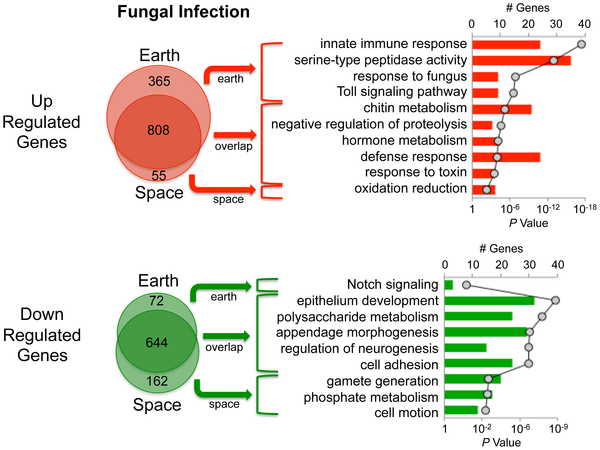Everyone with a sense of adventure wants to go to 'the final frontier' and explore strange new worlds.
But bring your medication. It might not be good for your immune system.
It's so surprise that spaceflight affects immune responses but the new paper clarifies that a bit and says that being born in and growing up on the Space Shuttle weakened a key arm of the immune system in Drosophila flies, while being in a centrifuge under hypergravity conditions improved resistance.
Long-term space travel would likely have a centrifuge anyway, to keep up bone and muscle mass, and this immune system finding adds to the possible benefit.

A Microarray-based analysis of response to B. bassiana. The total number of genes upregulated or downregulated in Earth flies only (Earth) or space flies only (Space) or in both (overlap) are indicated by Venn diagrams. Pathway analysis of each of these groups is shown on the right side of the figure. The number of genes in each functional category is depicted in bar graphs (primary y-axis), and the P values corresponding to statistical over-representation of each category are presented as a line graph (secondary y-axis). Note that certain genes annotated into more than one of these categories.
The flies were sent into space as eggs on a 12-day mission aboard the Space Shuttle Discovery. The flies take about 10 days to develop into adults. After they returned to Earth, responses were tested to two different infections: a fungus, which flies fight off through a pathway mediated by the Toll receptor, and a bacterial infection that flies resist through a gene called imd ("Immune deficiency").
Both the Toll and Imd pathways have counterparts in humans and other mammals. While the response through the Imd pathway was robust, the Toll pathway was "non-functional" in space-raised flies
In Earth-based experiments, the researchers found that when flies were tested in a centrifuge under hypergravity conditions, their resistance to the fungus was improved, suggesting that their Toll pathway was boosted. However, for the mutant yuri gagarin (named after the Soviet cosmonaut, first human into space), which lacks normal responses to gravitational fields, resistance was the same at normal and hypergravity, further demonstrating a link between gravity and the immune response.
How does microgravity affect the immune system? They have two hypotheses in mind, which are testable both in humans and flies.
Firstly, the space flies also showed high expression of genes for heat-shock proteins, which are produced in response to physiological stress. Heat shock proteins bind directly with mammalian Toll receptors, Kimbrell said, and may also moderate Toll activation in Drosophila. Another possibility is that microgravity interferes with the behavior of proteins outside the cell -- an area which is more important for Toll than for imd signaling.
The team hopes to carry out future research with flies on the International Space Station.






Comments